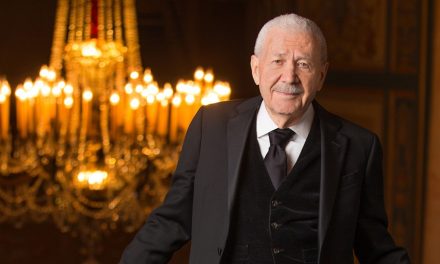A returning citizen’s fight to find work
May 24, 2018 – Bill Kubota, Detroit Public Television’s One Detroit
March, 2018.

Nick Buckingham talks to Rep. Dave Pagel (R) Berrien Springs with returning citizens Calvin Evans and Shaka Senghor
Nick Buckingham, age 34, has come to Lansing with some other activists where they’ve got some face time with a state lawmaker.
“I’m a criminal justice reform organizer for Michigan United,” he says, sliding his business card to Michigan State Representative Dave Pagel.
Pagel, a Republican from the southwest side of the state chairs the House Appropriations Subcommittee on the Department of Corrections while Michigan United is a coalition of faith-based, labor and social justice groups where Buckingham has been helping returning citizens like himself after serving seven years for armed robbery.
Returning citizens, more often called ex-cons or ex-offenders until recent efforts to lift the stigma faced by those who’ve done prison time.
Pagel listens as Buckingham talks, “I came home in 2012. In ninety days I went back.”
The first time Buckingham got out he quickly found work at a Family Dollar store.
“I went from 72 cents a day to making nine dollars an hour. I got my first check, I did the nay-nay,” Buckingham said, “I remember having the conversation with the young woman that hired me and she made this bold statement the Family Dollar is a felon friendly employer.”
But not for Buckingham. After a background check, he said the retailer decided he hadn’t been out of prison long enough and was let go.
“I didn’t know how to cope with that anxiety and the depression at that time,” Buckingham continued. “I have parole to pay, I have to go pay my drug test, my parole agent was not one of the best people this side of the Milky Way.”
He said his parole officer wanted money up front.
“One thing I knew I was comfortable doing was going back into the streets.”
Buckingham sold marijuana, got caught by police and went back into the system.
Back inside, he said, “my third eye opened up.”
He asked other inmates why they came back.
Their troubles, he said, are rooted in joblessness, homelessness, poor family support and a lack of preparation provided by the Department of Corrections in the weeks before they were released.
“You’re offered a 90-day pre-release program that the only requirement is tuck in your shirt, make your bunk, don’t catch any tickets, ”Buckingham said,“ so it doesn’t generate the idea of how to go out in the world and be productive and successful.”
Pagel responded, “We need to get you a stronger voice in re-entry and those 90 days before, and the whole process.”

Buckingham shows one of the background reports he says kept him from a job with Walmart.
Buckingham writes emails from the basement of his church, Church of the Messiah in Detroit near the bridge to Belle Isle. He pulls out a white binder holding the papers that document his life so far. There’s the police report detailing his crime and certificates he earned while he was still inside.
“I’ve got a certification in custodial maintenance,” he said. “I got that in prison. I was trained to do almost anything a custodial maintenance person can do. I can run a buffer. I can strip floors. The crazy thing is a lot of returning citizens can’t get in the janitorial world because it gives us access to a lot of other people’s property and so there’s a trust factor that doesn’t allow us into those professions.”
The Buckingham pulls out copies of background reports he said kept him from getting jobs. He’s been working in the restaurant business and as a community organizer, all while going to college. He thought he found his calling in psychology until he talked to one of his professors.
“She said that was great, my goals, all of that was great.” Buckingham said, “But I would not be able to practice psychology in the state of Michigan because of my felony background.”
She suggested a degree in social work. Buckingham changed his major, but even then there were more obstacles to overcome.
“I had to do an internship and I was literally turned away from 20 different institutions,” he said. “What we were often hearing was that I just didn’t have enough years under my belt away from the criminal justice system.”

Buckingham graduated with a bachelor’s degree in social work from Oakland University in April 2018
Seven years out of prison, Buckingham graduated from Oakland University in April 2018 with a degree in social work, confident with his career ahead.
There have been a few changes in the law intended to help returning citizens, including House Bill 4065, sponsored by Representative Pagel. Governor Rick Snyder has signed the bill into law, creating a process allowing returning citizens to be hired by the Michigan Department Corrections.
“I don’t think we’d go back there to work as correctional officers,” Buckingham said, “but if we could be the ones to go back inside, those that have come home and been successful, and now to go back to the same system to educate these men and women and these children.”
“The same places that I walked, they’re walking. I’m definitely going to use my degree and probably take up the opportunity to get into the prison system.”
Nick Buckingham’s story is featured in this report that first aired on Detroit Public Television’s special One Detroit road show: Detroit’s Workforce of the Future on May 24, 2018.









